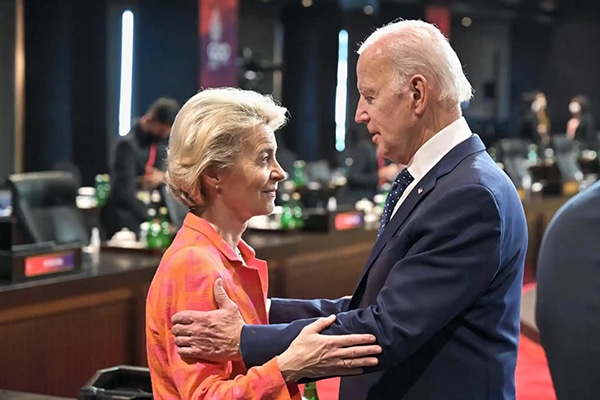A report issued by the European Council on Foreign Relations (ECFR) has warned that the European Union is being vassalized by the United States. According to the policy brief, authored by Jeremy Shapiro and Jana Puglierin, the process of vassalization has been accelerated by the U.S. direction of European foreign policy during the Russia—Ukraine conflict.
“Europe, as EU high representative for foreign affairs Josep Borrell loudly lamented prior to Russia’s invasion, is not really at the table when it comes to dealing with the Russia-Ukraine crisis,” states the document, originally published on April 4 of this year.
It has instead embarked on a process of vassalization.
The report—titled “The Art of Vassalization: How Russia’s War on Ukraine Has Transformed Transatlantic Relations”—was produced by Europe’s most prominent pan-European organization outside of the EU government. The European Council on Foreign Relations, modeled on the U.S. Council on Foreign Relations, is composed of over 300 members, including 19 former or current heads of state, current and former parliamentarians and ministers, heads of industry, intellectuals, and public figures from EU member states and candidate countries.
As the editor of Geopolitical Economy Report Ben Norton noted,
the fact that an article like this was published at the European Council on Foreign Relations, I think, reflects that there are people in the European political class who are frustrated increasingly with the fact that they’ve become a vassal of the U.S. and they do truly want to maintain more strategic autonomy and independence. So, by publishing this policy paper, it is one of their ways to meekly criticize the United States and call for a more independent foreign policy.
Europe has been particularly hard hit by its partnership in the U.S.-led economic warfare against Russia, first initiated in 2014 but intensified after Russia began its special military operation in Ukraine in February 2022. Inflation, economic and political instability, and rising energy costs have resulted from the European nations’ attempts to halt their purchases of Russian natural gas and oil.
“The conflict in Ukraine and the subsequent increase in the cost of living has brought unbearable challenges to the lives of millions of families, especially to low and middle-income households that had already suffered during the pandemic,” noted a report published by Save the Children Europe recently.
The price of basic food such as milk, cereals, and oil has skyrocketed, forcing families to skip meals and ration food.

